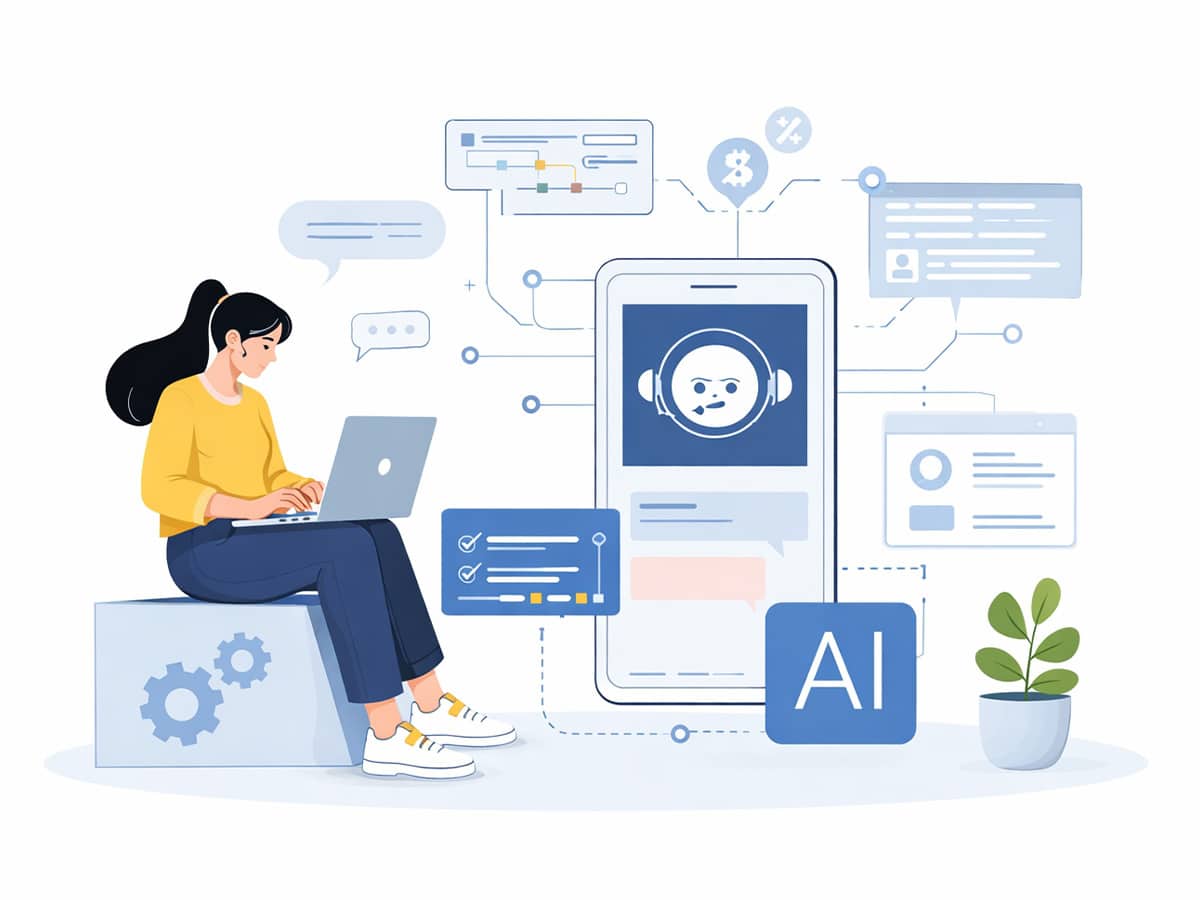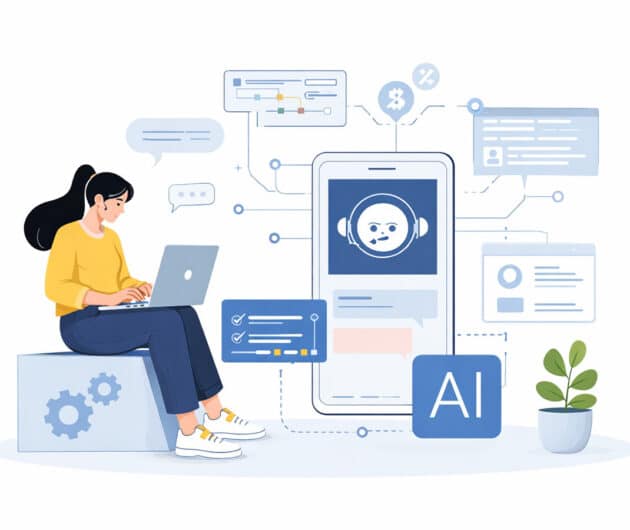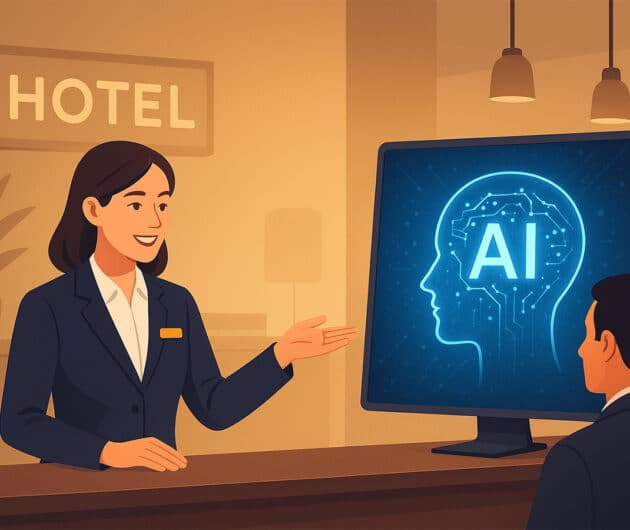Generative AI Solutions: The Competitive Edge for Modern Enterprises

-
Jignesh Nakrani
- September 29, 2025
- 5 min read
The rules of business have changed.
We’re no longer in a world where efficiency alone wins. In 2025, the enterprises that thrive are the ones that innovate faster, automate smarter, and adapt before competitors even see disruption coming. And at the center of this transformation is one technology: Generative AI.
This isn’t about chatbots writing content or gimmicky image generators. This is about enterprise-grade Generative AI solutions that are redefining how modern businesses operate. From automating workflows across departments to designing new products, predicting market shifts, and delivering personalized customer experiences at scale, Generative AI has become the ultimate competitive edge.
Think of it this way:
- Businesses that adopt AI early are scaling revenue while cutting operational costs.
- Businesses that delay are watching competitors outpace them in speed, innovation, and customer trust.
By 2026, 80% of enterprises will have adopted Generative AI as a core part of their business strategy. From automating workflows to accelerating product design, Generative AI isn’t just another tech trend — it’s becoming the competitive edge modern businesses can’t afford to miss.
Generative AI has moved past the stage of hype and experimentation. The question isn’t whether it will reshape enterprises — it already is. What matters now is understanding where it creates the most impact, how enterprises are applying it today, and what strategies can turn AI adoption into a long-term competitive advantage.
If you’re wondering how generative AI solutions can transform your enterprise, drive measurable growth, and give you a lead in your industry, this guide is for you.
But before we dive deep, let’s set the stage.
◉ What Is Generative AI and Why Does It Matter for Enterprises?
Generative AI refers to AI systems capable of creating new outputs — text, code, designs, insights, workflows — based on data and prompts. Unlike traditional AI, which mostly analyzes or predicts, enterprise generative AI applications can actually generate value in real time.
For enterprises, this shift is massive. It means AI is not just a back-office automation tool — it’s a frontline business partner that can:
- Write customer emails.
- Generate reports in seconds.
- Design product prototypes.
- Automate entire workflows.
- Offer predictive insights for decision-making.
This is why AI-powered business transformation is now at the heart of every serious digital strategy. Companies that deploy generative AI for workflow automation and process automation are already operating leaner, faster, and more profitably than their competitors.
◉ Why Generative AI Is the New Competitive Advantage
Modern enterprises face unrelenting pressure: rising costs, rapid market shifts, customer demands for personalization, and global competition. Traditional tools can’t keep up. Generative AI solutions offer a breakthrough by combining speed, scale, and intelligence.

Here’s how it delivers competitive advantage:
- Efficiency at Scale: Automating repetitive processes like document drafting, data entry, and reporting frees teams to focus on innovation.
- Faster Innovation: AI-driven product design and simulation accelerate time-to-market.
- Predictive Decision-Making: Enterprise AI tools analyze massive datasets to provide real-time insights, improving strategic decisions.
- Cost Optimization: Businesses save resources by automating workflows and reallocating staff to higher-value projects.
Hyper-Personalization: Enterprises use AI to personalize customer experiences at a 1:1 level — something humans alone cannot achieve at scale.
Enterprises that invest in generative AI and focus on scaling AI adoption across teams and processes today will be tomorrow’s market leaders.

◉ Latest Trends in Generative AI for Enterprises
Generative AI is evolving rapidly, and enterprises need to stay ahead of trends to remain competitive. Here are the most impactful developments:
1. Rise of Agentic AI Systems
Unlike traditional AI chatbots that respond passively, agentic AI for business takes initiative — it can plan tasks, execute actions, and adapt based on outcomes. Imagine an AI agent that not only drafts a marketing campaign but also schedules it, tracks performance, and optimizes results automatically.
2. Workflow Automation Across Departments
2025 is the year of end-to-end workflow automation. Instead of siloed tools, enterprises are integrating generative AI across finance, HR, supply chain, and customer service. This creates unified, intelligent operations.
3. Industry-Specific AI Models
From healthcare diagnostics to financial compliance, enterprises are adopting custom generative AI models trained for their sector. These outperform generic tools by offering higher accuracy and domain relevance.
4. Governance and Responsible AI
As adoption grows, enterprises demand AI systems with built-in governance, compliance, and auditability. Ethical AI and data privacy are becoming board-level priorities.
5. AI-Driven Digital Transformation
Generative AI is no longer an “add-on.” It’s the core driver of digital transformation strategies, reshaping how enterprises design, operate, and deliver.
◉ Real-World Enterprise Applications of Generative AI
To understand the power of AI solutions for business, let’s explore some high-impact enterprise use cases:

1. Marketing and Customer Engagement
- Generate personalized ad copy, email campaigns, and landing pages.
- Predict customer behavior and recommend products dynamically.
- Create chatbots that deliver 24/7 customer service with human-like responses.
2. Finance and Operations
- Automate financial reporting, invoice processing, and fraud detection.
- Forecast demand, optimize logistics, and reduce supply chain bottlenecks.
- Generate predictive insights that reduce risk and improve profitability.
3. Product Development and Innovation
- Generative design tools help engineers and designers create multiple prototypes instantly.
- AI simulations predict how products will perform, cutting R&D time significantly.
4. Human Resources and Talent Management
- Screen resumes and generate shortlists of candidates.
- Build personalized onboarding materials.
- Create AI-powered training modules tailored to employee skill gaps.
5. Knowledge Management and Internal Productivity
- AI knowledge assistants help employees find documents, data, and insights instantly.
- Automated meeting notes, summaries, and task allocation boost productivity.
The message is clear: Generative AI applications are enterprise-wide, not department-limited.
◉ How to Implement Generative AI Successfully in Your Enterprise
Adopting generative AI requires a solid strategy. Here’s a practical roadmap:
Step 1: Identify High-Impact Use Cases
Focus on areas where AI for process automation can deliver measurable ROI — repetitive, time-consuming, or creative tasks.
Step 2: Choose the Right Enterprise AI Tools
Options range from off-the-shelf platforms to custom AI development services. The right choice depends on your industry, scale, and goals.
Step 3: Build a Data-Ready Foundation
Generative AI thrives on data. Enterprises must invest in clean, structured, and secure datasets. Without this, AI models underperform.
Step 4: Pilot and Scale
Start with one high-value pilot project, measure success, then scale AI adoption across departments.
Step 5: Train Teams and Manage Change
AI adoption isn’t just tech—it’s culture. Training employees to work with AI ensures smooth integration.
Step 6: Monitor, Optimize, and Govern
Track KPIs like cost savings, process speed, and customer satisfaction. Continuously refine models and ensure compliance with governance frameworks.

◉ Business Outcomes: What Enterprises Gain with Generative AI
Enterprises that embrace AI in digital transformation are seeing real results:
- Cost Reduction: Up to 40% savings in operations.
- Time Savings: Report generation cut from hours to minutes.
- Higher Productivity: Employees focus on strategy while AI handles execution.
- Revenue Growth: Personalized campaigns drive higher conversions.
- Customer Loyalty: Faster, smarter engagement builds trust.
In other words, business productivity with AI is no longer theoretical — it’s measurable and proven.
◉ Overcoming Challenges in Enterprise AI Adoption
Despite the benefits, enterprises face some hurdles:
- Data Security & Privacy: Protecting sensitive data during AI training.
- Integration with Legacy Systems: Many enterprises still run on outdated infrastructure.
- Change Resistance: Employees may fear AI replacing jobs.
- Scalability Issues: Moving from pilots to enterprise-wide deployment can be complex.
The solution? Partner with experienced AI development services providers who understand both technology and business strategy.
◉ Why Now Is the Right Time
Generative AI is at a tipping point. Early adopters are already:
- Delivering faster innovation cycles.
- Automating workflows across functions.
- Reducing costs while scaling revenue.
- Building a future-ready enterprise culture.
Waiting is not an option — competitors are already moving. The sooner your business embraces generative AI solutions, the stronger your competitive advantage will be.
◉ Summing up
Generative AI is no longer about experimenting with new technology — it’s about redefining how enterprises compete, grow, and lead. The companies that act now will set the pace for innovation, efficiency, and customer trust, while those that hesitate risk being left behind. In this new era, Generative AI isn’t just a foundation for business transformation — it is the competitive edge that decides who leads and who follows.
You may also like

How Agentic AI Is Transforming SaaS Applications
-
Ankit Patel
Software-as-a-Service has always promised efficiency. But until recently, most SaaS products still depended heavily on human effort — clicking buttons, setting rules, monitoring dashboards, and reacting to problems after they… Read More

AI Chatbot Development Cost 2026: Enterprise Pricing Guide
-
Jignesh Nakrani
If there’s one technology that is reshaping how modern businesses operate, it is AI chatbots, and that is not an overstatement. Today, 78% of global enterprises use conversational AI in… Read More

Top 10 AI Agent Use Cases Driving Business Growth in 2026
-
Ankit Patel
Repetitive tasks, endless approvals, and drowning in data are common challenges for businesses today. But imagine if all of that could disappear. Welcome to the world of AI agents for… Read More





